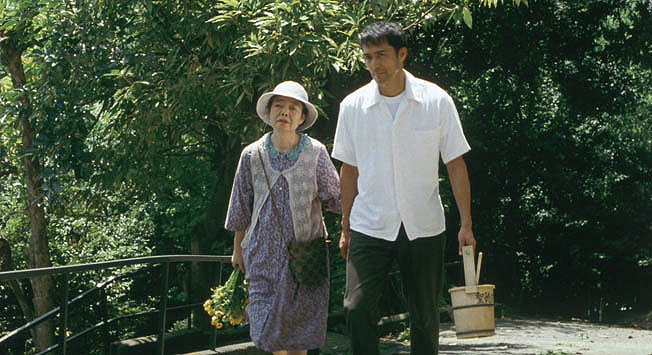|
|
THURSDAY 26 APRIL
Doors: 7.30pm Film: 8pm Still Walking (U) Here is a lyrical, profoundly moving, yet gently humorous film by Hirokazu Kore-eda, director of Our Little Sister. His most personal work to date, the film depicts one day in the life of the Yokoyama family, who are gathered together for a commemorative ritual whose nature only gradually becomes clear. Rather than focus on big dramatic moments, Kore-eda relies on simple gestures and domestic routines to evoke a family’s entire life, its deep regrets and its daily joys. Absolutely pitch-perfect and featuring vivid, heartrending and heartwarming performances with a gentle naturalism, Still Walking is an extraordinary portrayal of the ties that bind us. |
Review

Stll Walking review
Peter Bradshaw The Guardian A major retrospective for Yasujiro Ozu at London's BFI Southbank provides exactly the right context for appreciating this moving new film, Hirokazu Kore-eda's Still Walking, which I first saw at the San Sebastian film festival in 2008, and which definitely grows with a second viewing. It is a "family movie" in the classic Japanese style, and a variant – offered in an intelligent, if interestingly humble spirit of homage – to Ozu's Tokyo Story. It is as if Kore-eda is the wayward elder son making a bow to the great patriarch. Yoshio Harada plays a retired doctor, an imperious, querulous old man, who lives by the seaside with his elderly wife: his two grownup, married children are coming for a visit. There is a daughter, who is close to the mother, and shares with her an exasperation with the cantankerous father and his ways; she's continually urging her parents to come and live with her and her hearty, amiable husband. The son is Ryo (Hiroshi Abe) who has just married a widow, Yukari (Yui Natsukawa), and become a stepfather to her young boy – the father disapproves of the marriage as being somehow second best. There is a spectre at this feast. The oldest son, Junpei, was killed as a boy saving the life of a schoolfriend from drowning, and this boy has grown up to be a tiresome chump and a loser. From an obscure spirit of masochism, of strained politeness and also a strange need to punish this man for living while their beloved son has died, they insist on inviting him to tea, excruciatingly, every year, in the presence of their children – and of course he cannot refuse. Ryo is angry at being made to feel second best, silently seething at all the fond anecdotes about how great Junpei was, and conceals from his father the fact of his own humiliation – that he is actually out of work at the moment. The old man is of course angry and depressed, and has remained in this condition for decades. Strangely, it is Ryo's little stepson who the old man reaches out to, calling himself the boy's "grandpa". Unlike family dramas as conceived of in British or American drama, there are no crockery-smashing rows. Resentments and anger are contained within the conventions of politeness and respect. But this, I think, reflects the truth about the quiet, undramatic real lives of all families anywhere, and this, I think, is incidentally why Ozu is so passionately loved all over the world, despite his producers' initial fears that his work would not travel because it is too Japanese. With great dramatic strength and deliberation, Kore-eda is extending and developing this tradition. Of course, the notion of the "better" son dying is becoming a bit of a cliche in Hollywood, with the much-spoofed Walk the Line, but this is a higher order of storytelling, and this gentle, lovely film is impossible to watch without a lump in the throat. |
Director: Hirokazu Kore-eda
Writer: Hirokazu Kore-eda Cinematographer: Yutaka Yamasaki Starring: Hiroshi Abe, Yui Natsukawa, You, Kazuya Takahashi Running time: 114 mins. Other Reviews Rotten Tomatoes - 100% The Guardian - ★★★★ The Telegraph - ★★★★ The Independent - ★★★ The Times - ★★★★ |













